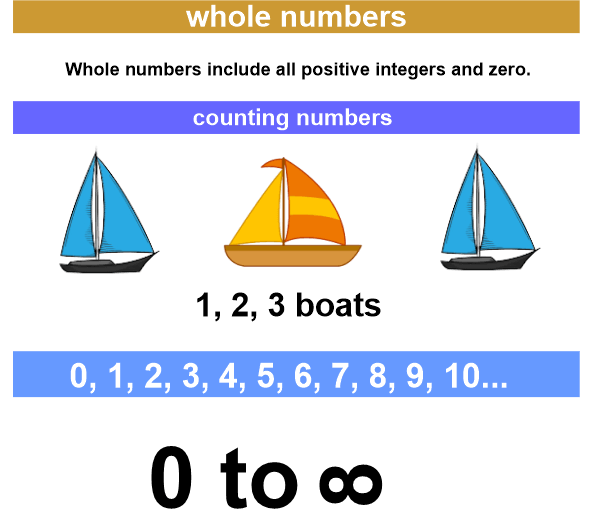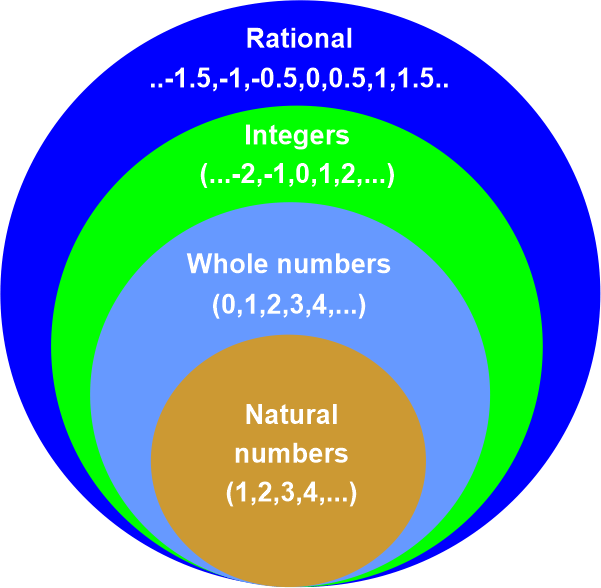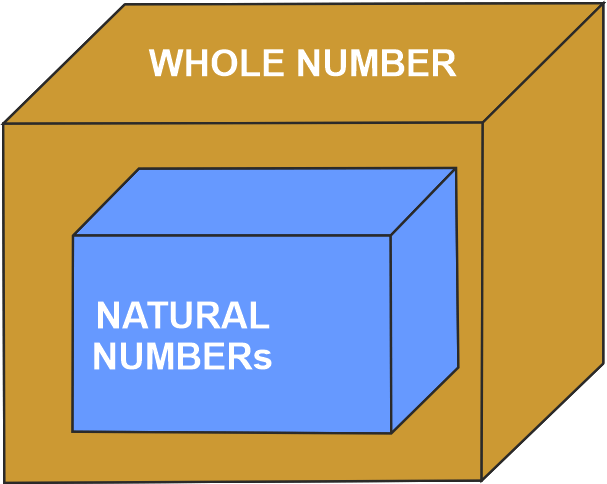Whole-Numbers DefinitionThe whole number is a part of the Number system, and it covers all the numbers from zero to infinity. All these numbers are available on the number line. Therefore, they are also termed Real numbers. It also must be concluded as all whole numbers are considered real numbers, but vice versa is not true in this case. It can also be said to be the set of natural numbers and zero. Similarly, integers are also defined as a set of whole numbers and negative natural numbers. Integers count both negative and positive numbers and include zero. Real numbers contain all sets: fractions, natural numbers, integers, and whole numbers. 
Examples of whole numbers include 0, 11, 25, 999…… Definition
Those numbers are not in the p/q form or fractions, and it is a set of positive numbers that includes zero. The whole number is denoted by the letter "W." Since Zero is also part of the whole number system, it denotes a null or nothing value. Counting Numbers: Natural NumbersN = IntegersZ = Whole NumberW = {0, 1, 2, 3, 4, 5, 6, 7, 8, 9, ….} It all contains the positive value and includes zero also. It does not contain decimal and fractional values. Properties of the Whole number
The properties of the whole number have been concluded from arithmetic operations like Addition, Subtraction, Multiplication, and Division. AdditionWhen two whole numbers are added or multiplied, the whole number is the result. SubtractionDeduction or subtraction of two whole numbers may not result in the whole number. The outcome could be an integer too. DivisibilityThe division of the whole number may result in getting a decimal or fractional value. We would see more properties of the whole and will become clear with the proofs and examples. Closure PropertyIt means it can be closed under multiplication and addition. Suppose x and y are two whole numbers; then x + y or x.y will also be a whole number. Example Suppose 6 and 8 are the whole number 6 + 8 = 14; 14 is a whole number 6 x 8 = 48: it is a whole number. Commutative Property of Addition and MultiplicationThe product and Sum of two whole numbers will be coming out to be the same irrespective order in which they have multiplied or added. Consider x and y to be two whole numbers, then x.y = y.x and x + y = y + x For example Consider 10 and 3 to be the whole number 10 + 3 = 13 3 + 10 = 13 Therefore 10 + 3 = 3 + 10 Similarly, 3 x 7 = 21 7 x 3 = 21 Therefore, 3 x 7 = 7 x 3 So, we can say that whole numbers are commutative under multiplication and addition. Additive IdentityThe value remains constant when a 0 is added to the whole number. Consider the x to be a whole number, then x + 0 = 0 + x = x Example Suppose 0 and 5 are the two whole number 0 + 5 = 5 5 + 0 = 5 0 + 5 = 5 + 0 So, we can conclude that 0 is the additive identity of the whole number. Multiplicative IdentityThe outcome remains the same when a whole number is multiplied by 1. Suppose the whole number is to be x, then 1. x = x.1 Example Suppose two whole numbers, 1 and 13 1 x 13 = 13 13 x 1 = 13 So, 1 x 13 = 13 x 1 One = Multiplicative identity of whole numbers. Associative PropertyWhen the whole number is multiplied or added as a set, it can be constituted into any order, and the outcome will remain unchanged. Suppose the x, y, and z be the whole number, therefore: x + (y + z) = (x + y) + z and (x. y) .z = x. (y. z) Example Let 5, 6, and 7 be the whole number, 5 + (6 + 7) = 13 + 5 = 18 (5 + 6) + 7 = 11 + 7 = 18 Therefore, 5 + (6 +7) = (5 + 6) + 7………… (1) 5 x (6 x 7) = 5 x 42 = 210 (5 x 6) x 7 = 30 x 7 = 210 Therefore, 5 x (6 x 7) = (5 x 6) x 7 ……………(2) So, from equations (1) and (2), we can conclude that the associative property under multiplication and addition is true. Distributive PropertyIf a, b, and c is to be three whole number, the distributive property of multiplication over addition is a. (b + c) = (a.b) + (a. c). In the same way, a. (b - c) = (a. b) - (a. c) Example let 2, 3, and 4 be the whole number 2 x (3 + 4) = 2 (7) = 14 (2 x 3) + (2 x 4) = 6 + 8 = 14 Therefore, 2 x (3 + 4) = (2 x 3) + (2 x 4) …………… (1) Let us assume that 6, 8, and 4 be the three whole number 6 x (8 - 4) = 6 x 4 = 24 (6 x 8) - (6 x 4) = 48 - 24 = 24 Therefore, 6 x (8 - 4) = (6 x 8) - (6 x 4) …………… (2) From equations (1) and (2), the distributive property of the whole number is verified. Multiplication by zeroWhen a whole number is multiplied by zero, the outcome is always zero. Let's assume that a be the whole number. Then, a x 0 = 0. Example, 0 x 17 = 0 13 x 0 = 0 14 x 17 x 0 = 0. Therefore, the law is verified. Divisibility by ZeroWhen a whole number is divided by Zero, the result is either infinity or zero. For example, a is the whole number, and the result is not defined when divided by zero. Dissimilarities between Natural numbers and the whole number Natural Number
Whole Number
Fun facts
Frequently Asked QuestionsQuestion: Is there any negative whole number in the number system? Ans: The whole number cannot be negative. According to the definition, the whole number begins from 0, 1, 2, 3, 4, 5, 6, 7, …. Question: Using distributive property, solve 10 (2 + 3). Answer: Distributive Property: a x (b + c) = (a x b) + (a x c) 10 x (2 + 3) = 10 x 5 = 50 (10 x 2) + (10 x 3) = (20) + (30) = 50 10 x (2 + 3) = (10 x 2) + (10 x 3) 50 = 50 Question: Which number is not considered to be a whole number? Answer: Rational numbers, fractions, and decimals are not considered whole numbers. For example, 4.5, 6/7, 4.55555, and pi are not considered whole numbers. Question: Sum these 23, 45, and 67 in three different methods and also name the property that has been used. Ans: Method 1. 23 + (45 + 67) = 135 Method II. (45 + 67) + 23 = 135 Method III. (23 + 67) + 45 = 135. The property that has been used here is the associative property. Question: Under what circumstances the product of two whole numbers can become zero? Ans: The product of two numbers can become zero when one of the numbers is zero. We know that for any number multiplied by zero, the result is always zero. ConclusionIn brief, we can conclude that the Whole number plays an important role in the number system and plays a pivotal role in the arithmetic operation.
Next TopicCloud computing Definition
|
 For Videos Join Our Youtube Channel: Join Now
For Videos Join Our Youtube Channel: Join Now
Feedback
- Send your Feedback to [email protected]
Help Others, Please Share









